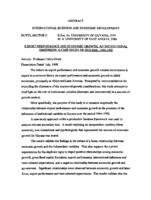- Collection:
- Atlanta University and Clark Atlanta University Theses and Dissertations
- Title:
- Export performance and economic growth, an institutional dimension: a case study of Guyana, 1964-1992, 1998
- Creator:
- Butts, Hector C.
- Date of Original:
- 1998-07-01
- Subject:
- Degrees, Academic
Dissertations, Academic - Location:
- United States, Georgia, Fulton County, Atlanta, 33.749, -84.38798
- Medium:
- theses
- Type:
- Text
- Format:
- application/pdf
- Description:
- The debate on export performance and economic growth remains inconclusive in regard to a common theory on export performance and economic growth in failed economies, principally in Africa and Latin America. Prompted by recommendations for expanding the dimension of the sources-of-growth considerations, this study attempts to shed light on the role of institutional variables (domestic and international) in a sources-of- growth context. More specifically, the purpose of this study is to examine empirically the relationship between export performance and economic growth in the presence of the influences of institutional variables in Guyana over the period 1964-1992. A case-study approach within a production function framework was used to analyze relevant secondary data. A model depicting six independent variables (three economic, two institutional and psychological) that represented the sources-of-economic growth for Guyana was tested. The results validate the findings in the debate of a linear relationship between economic growth and the independent variables. They also support the a priori expectations for the algebraic signs to depict positive relationships among economic growth, gross fixed capital formation, export performance, international influences and time-oriented expectations; and a negative relationship between economic growth and government. Significant relationships were observed between economic growth and labor force, export performance and time-oriented expectations. The results validate also the export promotion argument. However, the results contrast the major findings of positive relationships between economic growth and labor force and the significant role of capital. Further, the results suggest that both institutional variables, government and international influences, are insignificant and could be classified as irrelevant or redundant variables. The significance of the results is exhibited clearly in the support for the export promotion hypothesis and the suggestion that time-oriented expectations and labor force were significant influences in the economic growth process. The results suggest also an inverse relationship between the institutional influences. Large government size appears to be bad, while international institutional influences were relatively good for a small economy. In addition, harmonious relations in the political economy of international relations may be a pre-requisite for economic growth in small economies. The results suggest a need for further research based on this framework.
- External Identifiers:
- Metadata URL:
- http://hdl.handle.net/20.500.12322/cau.td:1998_butts_hector_c
- Rights Holder:
- Clark Atlanta University
- Holding Institution:
- Atlanta University Center Robert W. Woodruff Library
- Rights:
-
